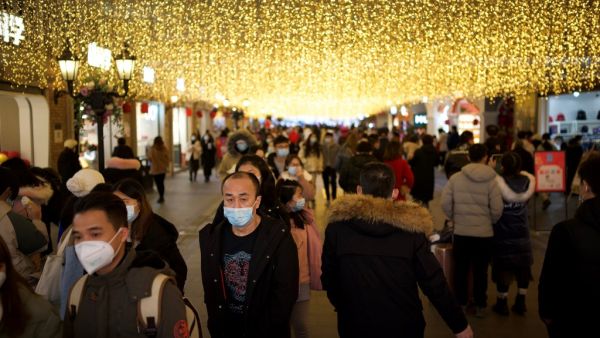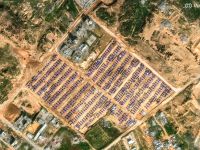Unmourned but never to be forgotten, 2020 started passing into history today with scaled-down festivities around the world as humanity bids good riddance to the year of the pandemic - although there were balloons and revelry in Wuhan where the virus began its trail of destruction 12 long months ago.
Most countries have already greeted the dawn of 2021, with the rest of the planet set to cross the invisible threshold in the coming hours.
In New Zealand, where only 25 people have ever died of Covid-19 and restrictions are virtually non-existent, crowds of partygoers packed into Auckland streets for midnight fireworks.
New Year's Eve: Wuhan vs Times Square pic.twitter.com/Q7VkmLIUhr
— Cari Kelemen (@KelemenCari) January 1, 2021
In Australia, which has also fended off the worst of the pandemic, life was normal enough for some revellers to gather in Melbourne and Sydney.
In the US, the year of the COVID-19 pandemic ended in with the famous ball drop in a deserted Times Square while millions watched from home, New York City Mayor Bill de Blasio dancing with his wife onstage, and partygoers packing into a Miami nightclub to ring in 2021.
Small groups of revelers, some wearing glittery hats, filmed their distant view of Times Square on their phones and broke out in cheers at midnight.
And in Wuhan - where the virus first surfaced at the very end of 2019 before spiralling catastrophically around the globe - hundreds gathered at landmarks around the city to welcome in the new year.
In what is sure to spark envy in many countries still subject to strict lockdown measures, party-goers were filmed crowding into a live music event in the former-Covid epicentre.
Many opted to go mask-free inside the venue where revellers danced just inches from each other.
But for most of the world's seven billion people, a grinding year is ending with typically muted festivities, with fireworks, pyre burnings and live performances set to be watched from home or cancelled altogether.
From France to Latvia to Brazil, police and military personnel are being deployed to enforce night-time curfews and bans on large gatherings are enforced, with much of the world still in lockdown and the vaccine race only just beginning.
Wuhan in 2020:
— The Chollima Report (@ChollimaOrg) January 1, 2021
How it started
How it ended pic.twitter.com/PBPmSgfiKP
Although New Zealand is still isolated by international border closures, months of zero recorded cases in the community have allowed life to return to relative normality - with crowds gathering for fireworks in Auckland in scenes which would seem unthinkable to most of the world.
In Sydney, fireworks lit up the glittering harbour with a dazzling display at midnight, but few spectators were there to watch in person.
Plans to allow crowds were scrapped amid a cluster of around 150 new infections that have seen travel to and from Sydney severely restricted.
How has Wuhan achieved this without a vaccine? Anyone? https://t.co/qrrhXdWYEE
— Allison Pearson (@allisonpearson) January 1, 2021
People were only allowed in Sydney city centre if they have a restaurant reservation or are one of five guests of an inner-city apartment resident. People will not be allowed in the city centre without a permit.
'I think everybody is looking towards 2021 as a fresh beginning and a fresh start,' Karen Roberts, among the lucky few who were allowed past checkpoints around the area, said at a bar near the Sydney Opera House.
Melbourne, Brisbane and Adelaide cancelled their displays to avoid large gatherings and possible community transmission of the virus.
Kiribati and Samoa were the first to cross the threshold of 2021 at 10am GMT, with the last Pacific islands set to follow them 26 hours later.
Although the Pacific islands were spared the worst ravages of the pandemic, border restrictions, curfews and lockdowns meant this New Year's Eve was still a little different.
At the palm-fringed Taumeasina resort in Samoa, manager Tuiataga Nathan Bucknall was pleased to be open without a limit on guest numbers, but thanks to a state of emergency stopped serving alcohol at 11 pm.
In harder-hit countries such as Italy - where shocking images of makeshift morgues and exhausted medics first awoke the world to the horror of the pandemic last spring - curfews and lockdowns are still in force.
In London, American singer-songwriter Patti Smith will ring in the New Year with a tribute to NHS workers who have died from Covid-19, projected on the screen at Piccadilly Circus and streamed on YouTube.
And in New York, the famous ball drop in Times Square will unfold this year without the usual throngs of cheering revellers. Police will block off the area so that spectators cannot even get a glimpse.
Since it surfaced in China in late 2019, the coronavirus has infected more than 80million people and led to nearly 1.8million deaths, the majority of them in Europe and the Americas.
Although mass vaccination efforts have begun in many countries in recent weeks, offering hope that the end of the pandemic is in sight, it is likely to be months before normal life can return in most of the world.
In China, where the Lunar New Year generally takes precedence over January 1, a countdown ceremony will take place in Beijing with just a few invited guests while other planned events have been cancelled.
Hong Kong, with its British colonial history and large expatriate population, has usually seen raucous celebrations along the waterfront and in bar districts.
For the second year running, however, New Year's Eve fireworks have been cancelled, this time over coronavirus rather than public security concerns.
In Japan, some people skipped what is customarily a chance to return to ancestral homes for the holidays, hoping to lessen health risks for extended families.
Rural restaurants saw business drop, while home deliveries of traditional New Year's 'good luck' food called 'osechi' boomed.
Emperor Naruhito is delivering a video message instead of waving from a window with the imperial family as cheering crowds visit the palace.
In Dubai, thousands are expected to attend a fireworks and a laser show at Burj Khalifa, the world's tallest tower, despite a slew of new cases.
All those attending the event - whether at a public place, hotel or restaurant - will be required to wear masks and register with QR codes.
In Beirut, a city still reeling from the August 4 port explosion, authorities are also cutting loose. A night curfew has been pushed back to 3am. Bars, restaurants and night clubs have all reopened and are advertising large parties to mark the turn of the year.
Social media networks are already inundated with images and videos of packed clubs and restaurants, leading authorities to warn that a new lockdown may come into force after the holidays.
The fears of such a New Year hangover are widespread, and there are ominous signs that new strains of the virus may make the coming months even tougher.
In Brazil - which has already recorded more than 193,000 Covid-19 deaths, the second-largest number in the world - fearful medics await a new wave.
In recent days, social media has been filled with videos showing mask-less revellers enjoying a night out and television channels have even shown live images of police closing bars full of customers.
'The pandemic peak was between May and July, which was when there wasn't a lot of movement and we looked after ourselves more. Now there are many cases and people are acting as if there wasn't a pandemic,' said Luiz Gustavo de Almeida, a microbiologist at the University of Sao Paulo.
This article has been adapted from its original source.








